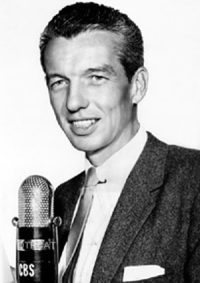
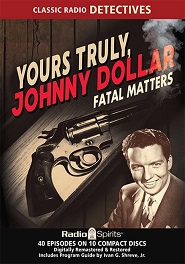 Yours Truly, Johnny Dollar (1949-1962) aired“The Loss of Memory Matter” on June 2, 1957. We’ve showcased but two earlier episodes of this highly regarded show, the last being almost a year ago on May 2, 2020. Guest host Pete Wood wrote the introduction to that episode, from which I have taken the liberty of selectively editing for current purposes and for those not familiar with the show.
Yours Truly, Johnny Dollar (1949-1962) aired“The Loss of Memory Matter” on June 2, 1957. We’ve showcased but two earlier episodes of this highly regarded show, the last being almost a year ago on May 2, 2020. Guest host Pete Wood wrote the introduction to that episode, from which I have taken the liberty of selectively editing for current purposes and for those not familiar with the show.
Johnny Dollar ran on CBS from February 18, 1949 until September 30, 1962. Three actors—Charles Russell, Edmond O’Brien, and John Lund—played Dollar as a not too original tough-talking private eye until the initial incarnation ended in September, 1954.
After a one year hiatus the show returned with a new star and a new format. Bob Bailey (1913-1983, photo top right) played Dollar as a freelance insurance investigator, and radio veteran Jack Johnstone took over production and directing duties, as well as writing many of the episodes.
Bob Bailey was Dollar until November 1960 when the network fired him when he refused to relocate from Hollywood to New York. Bob Readick then portrayed Dollar from December, 1960 until June 1961 with Mandel Kramer taking over the role until the program’s last episode in September of 1962.
Bob Bailey was the heart and soul of the series. Of the 827 episodes, Bailey played Dollar for 484. Second place O’Brien, by contrast, only appeared in 103 episodes.
The show typically began with a phone call from some insurance executive who wanted Dollar to investigate some unusual claim. Dollar traveled all over the United States and sometimes out of the country. He told the story through flashbacks as he explained each item on his “action-packed expense account.”
Bob Bailey had a long radio career, beginning in the early thirties and ending with Johnny Dollar. He starred in programs too numerous to name, but his most successful role until Johnny Dollar was as private investigator George Valentine in Let George Do It from 1946 to 1954 on the Mutual Broadcasting System. Virginia Gregg, who portrayed Nancy Turner, played his secretary, Brooksie, for many episodes.
 While she does not appear in this episode, Virginia Gregg (1916-1986) had roles in dozens of Yours Truly, Johnny Dollar episodes and had a long career in radio, television and films. She appeared on such radio programs as The Adventures of Sam Spade, Dragnet, Dr. Kildare, Gunsmoke, The Jack Benny Program, One Man’s Family, The Zero Hour and Mutual Radio Theater. She often did double duty with roles in both the radio and television versions of programs. Gregg once said of her work as a character actress on television: “I work steadily, but I have no identity.” She added, “When casting people have a call for a woman who looks like the wrath of God, I’m notified.” On television, Gregg appeared in programs such as Hawaiian Eye, 77 Sunset Strip, Gunsmoke, Bonanza, Perry Mason, The Rockford Files, Maverick, My Favorite Martian, and The Twilight Zone. Her forty five film roles included the voice of Mrs. Bates in Psycho, Psycho II, and Psycho III. Oh, yeah, and she also played double bass for the Pasadena Symphony.
While she does not appear in this episode, Virginia Gregg (1916-1986) had roles in dozens of Yours Truly, Johnny Dollar episodes and had a long career in radio, television and films. She appeared on such radio programs as The Adventures of Sam Spade, Dragnet, Dr. Kildare, Gunsmoke, The Jack Benny Program, One Man’s Family, The Zero Hour and Mutual Radio Theater. She often did double duty with roles in both the radio and television versions of programs. Gregg once said of her work as a character actress on television: “I work steadily, but I have no identity.” She added, “When casting people have a call for a woman who looks like the wrath of God, I’m notified.” On television, Gregg appeared in programs such as Hawaiian Eye, 77 Sunset Strip, Gunsmoke, Bonanza, Perry Mason, The Rockford Files, Maverick, My Favorite Martian, and The Twilight Zone. Her forty five film roles included the voice of Mrs. Bates in Psycho, Psycho II, and Psycho III. Oh, yeah, and she also played double bass for the Pasadena Symphony.
An oft-quoted saying goes that those who forget or who do not know history are doomed to repeat it. “The Loss of Memory Matter” takes that adage a step further, for not only does Johnny—through circumstances beyond his control—lose what history of the world he has accumulated throughout his life, but even his own memory, including, of course, who he is. And rest assured a bad guy will use this against him when this vulnerability becomes obvious. It all begins in the usual fashion for Dollar, with a phone call from an insurance company. This job involves highly prized artifacts—scrolls and tablets—from the temple of Baal, a god worshipped in the 4,000 year-old city of Ur (a Sumerian city-state in what was then known as Mesopotamia), whose ruins still stand near the confluence of the ancient biblical rivers of the Tigris and Euphrates in southern Iraq. The owner of the antiquities has decided to sell them to a local museum in Connecticut, but is worried that there might be trouble during transit to the museum, hence the insurance company responsible for them calling Dollar to make sure nothing happens to their insured merchandise, which would cost them a fortune should they be damaged or stolen. So follow now Johnny Dollar as he must first overcome the loss of his own identity before he can deliver priceless historical treasures from the ancient Babylonian city of Ur to their final resting place.
Play Time: 29:40
{This episode of Yours Truly, Johnny Dollar aired on a Sunday night in early June of 1957, which meant that summer vacation had just begun and the neighborhood gang could hit the nearby newsstand early the next day for their fix of excitement and adventure. Astounding SF (1930-present, now Analog) had long been a mainstay for as long as they could remember and so was an automatic choice. Except for a brief hiccup in 1932-33 it had held to its monthly publication schedule for all of its 27 years, up to and including 1957. The Magazine of Fantasy & Science Fiction (1949-present) began as a quarterly in the Fall of 1949, quickly transitioned to a bi-monthly in 1951, and attained a full monthly schedule in August of 1952, which regular schedule it held without changes for almost the next 40 years, at which time it would combine its Oct./Nov. issue into one double issue, all other issues remaining monthly, making for an 11-issue per year schedule. Galaxy (1950-1980) was the other relatively new kid (along with F&SF) in the SF publishing universe and hit the ground running with a monthly schedule from its debut issue forward until 1959 when it settled into a bi-monthly schedule. From 1959-67 it maintained its bi-monthly status but from then on its schedule became so erratic it was difficult to guess how many issues a year its fans could expect. The fiction was top notch, but for whatever reason (the changing marketplace mostly) it could never maintain a regular schedule from 1968 until its demise in 1980. That said, it should not be overlooked that all three of the magazines featured below published much worthy, award-winning fiction, a fair number of stories or serialized novels attaining classic status in the field.}
[Left: Astounding, June 1957 – Center: F&SF, June 1957 – Right: Galaxy, June 1957]
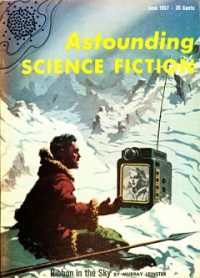
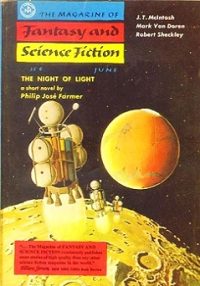
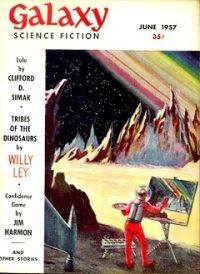
To view the entire list of Old Time Radio episodes go here.